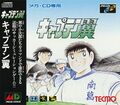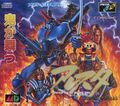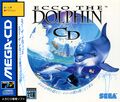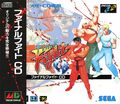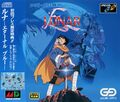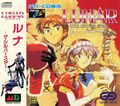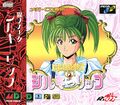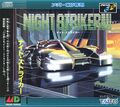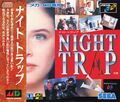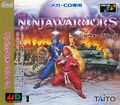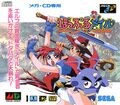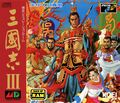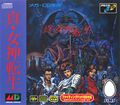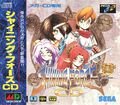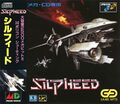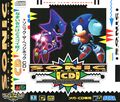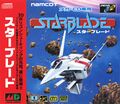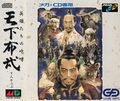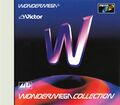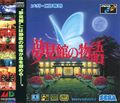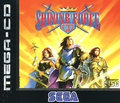Mega Drive Mini 2
From Sega Retro

| |||||||||||||||||||||||||||||||||||
| Mega Drive Mini 2 | |||||||||||||||||||||||||||||||||||
|---|---|---|---|---|---|---|---|---|---|---|---|---|---|---|---|---|---|---|---|---|---|---|---|---|---|---|---|---|---|---|---|---|---|---|---|
| Manufacturer: Sega, M2, DARTSLIVE EUROPE (EU) | |||||||||||||||||||||||||||||||||||
| Distributor: Amazon | |||||||||||||||||||||||||||||||||||
| Built-in games: 60 | |||||||||||||||||||||||||||||||||||
|
The Mega Drive Mini 2 (メガドライブミニ2), sold in North America as the Sega Genesis Mini 2 (セガジェネシスミニ2), is a miniature Sega Mega Drive 2 console with 60 built-in Sega Mega Drive and Sega Mega-CD games. It was released in October 2022 worldwide as a successor to the Mega Drive Mini.
Contents
Hardware
As a successor to the original Mega Drive Mini, the unit is designed to resemble the Sega Mega Drive 2 (or Sega Genesis Model 2) at 55% the size of the original, but is incompatible with any of the original games or controllers, relying solely on its built-in library of emulated games and slots for two USB peripherals. Video is output at 720p 60Hz via HDMI.
The hardware for the Mega Drive Mini 2 is largely the same as its predecessor, though with larger internal storage to include Mega-CD games. Much like its predecessor, Sega acquired the rights to feature games by a variety of third-party publishers in the Mega Drive Mini 2, including the likes of Game Arts, Namco, Capcom, Interplay, Electronic Arts and Taito.
The original plan was to create an entirely new mini console, though parts shortages as a result of the COVID-19 pandemic led to those plans being shelved and the Mega Drive Mini 2 to be made instead. This also resulted in a smaller production run than the Mega Drive Mini, as well as limited retail distribution through Amazon.
All models, including the North American and European models, include only one USB Six Button Control Pad, though all controllers manufactured for the Mega Drive Mini are also compatible. The North American model was also sold in Japan as a separate product.
Technical specifications
- Output: 1 HDMI port
- Storage: 8 GB NAND flash
- Other: 2 USB controller ports
Features
The Mega Drive Mini 2 presents the user with a graphical interface displaying the covers of every game included on the system. Ten covers are displayed on the screen at a time, but the user can choose to display all games at once by pressing ![]() , displaying their spines. The games can even be sorted alphabetically, by release date, by genre, by the number of supported players, by recently played, or have Mega-CD games listed first. The menu music is once again composed by Yuzo Koshiro.
, displaying their spines. The games can even be sorted alphabetically, by release date, by genre, by the number of supported players, by recently played, or have Mega-CD games listed first. The menu music is once again composed by Yuzo Koshiro.
Changing the system language in the settings menu will also change the menu interface to match the selected language, changing to a Japanese Mega Drive-themed menu for Japanese or Chinese, a Genesis-themed menu for English, French, Spanish or Korean (with the exception of European systems for these languages except Korean), and a PAL Mega Drive-themed menu for Italian and German. Most of the covers will also change to match those of the respective region, and alternate regional versions of the games can be played, however not all games have an alternate regional variant available and will remain the same. On the European system, most games are the North American versions, though a small number of games such as Robo Aleste, Sonic the Hedgehog CD and Soleil use the European versions though have the North American versions available via a menu that appears when starting the game or by changing the system language.
During a game, the user can call up System Menu at any time by pressing the RESET button on the console. From this menu, the user can save their progress to a savestate, with each game supporting up to four savestates. Savestates will also remember which region the game is set to, so if the system language is changed, and the savestate is loaded, the regional variant of the game that was played when the savestate was created will be loaded. The MODE button may also be used to open the System Menu, which can be configured in the settings to open the menu instantly (Quick Load) or to require the user to hold MODE for one or three seconds, or hold START instead. Configuring this setting to any setting other than Quick Load will allow the MODE button to be used in games that have a use for it (e.g. to enable free movement in Vectorman 2).
The settings menu gives the user the ability to alter the display in various ways. Games can be displayed in a 4:3 aspect ratio or they can fill the entire screen, along with an optional CRT filter that blurs the image and displays scanlines. When playing in a 4:3 ratio, the user can choose to have one of eight wallpapers displayed around the game screen to fill the blank space. The menu also includes a QR code that takes the user to a site hosting the original game manuals when scanned using a smartphone or tablet. New to the Mega Drive Mini 2 is a setting to choose between emulating the audio output of a Model 1 or Model 2 Mega Drive. Viewing the staff credits will display the boot ROM screens in the background, with the type being determined by the user's language and sound settings (e.g. setting the language to Japanese and the sound setting to Model 1 will display the Japanese Model 1 boot ROM screen).
List of games
While both editions of the Mega Drive Mini 2 contain 60 games, the lineup has been adjusted to better suit the region. Note that Sangokushi III is listed twice for both versions of the game, though both are officially counted as one game.
Japan
Mega Drive
- Aa Harimanada
- After Burner II*
- Alien Soldier*
- Bonanza Bros.*
- Chelnov*
- Columns III: Taiketsu! Columns World*
- Devi to Pii* (new)
- Ex-Ranza*
- Fantasy Zone* (new)
- Fushigi no Umi no Nadia
- Futari de Puyo Puyo Sun* (new)
- Gain Ground*
- Gambler Jiko Chuushinha: Katayama Masayuki no Mahjong Doujou
- Garou Densetsu 2: Aratanaru Tatakai*
- Granada*
- Honoo no Toukyuuji: Dodge Danpei
- Magical Taruruto-kun
- Megapanel
- Midnight Resistance*
- OutRun*
- Party Quiz Mega Q 2022 (new)
- Party Quiz Sega Q (new)
- Phantasy Star II: Kaerazaru Toki no Owari ni*
- Populous*
- Puzzle & Action: Ichidant-R
- Ragnacenty*
- Sangokushi III*
- Sanrin San-chan* (new)
- Shining and the Darkness*
- Sorcerian
- Space Harrier II / Space Harrier* (new)
- Splatterhouse Part 2*
- Star Cruiser
- Star Mobile* (new)
- Super Locomotive* (new)
- Super Street Fighter II: The New Challengers*
- Tatsujin*
- Thunder Force IV*
- Tougi Ou King Colossus
- Viewpoint* (new to Japan)
- Virtua Racing*
Mega-CD
- Captain Tsubasa
- Dennin Aleste*
- Ecco the Dolphin CD*
- Final Fight CD*
- Lunar: Eternal Blue
- Lunar: The Silver Star
- Mahou no Shoujo: Silky Lip
- Night Striker
- Night Trap*
- The Ninja Warriors
- Popful Mail
- Sangokushi III
- Shin Megami Tensei
- Shining Force CD*
- Silpheed*
- Sonic the Hedgehog CD*
- StarBlade*
- Tenka Fubu: Eiyuutachi no Houkou
- Wondermega Collection
- Yumemi Yakata no Monogatari*
* - North American version available.
North America / Europe
Mega Drive
- After Burner II
- Alien Soldier
- Atomic Runner
- Bonanza Bros.
- ClayFighter
- Crusader of Centy
- Desert Strike: Return to the Gulf
- Devi & Pii (new)
- Earthworm Jim 2
- Elemental Master
- Fantasy Zone (new)
- Fatal Fury 2
- Gain Ground
- Golden Axe II
- Granada
- Hellfire
- Herzog Zwei
- Lightening Force: Quest for the Darkstar
- Midnight Resistance
- The Ooze
- OutRun
- OutRunners
- Phantasy Star II
- Populous
- Rainbow Islands Extra
- Ranger-X
- The Revenge of Shinobi
- Ristar
- Rolling Thunder 2
- Shadow Dancer: The Secret of Shinobi
- Shining Force II
- Shining in the Darkness
- Sonic 3D Blast
- Space Harrier II / Space Harrier* (new)
- Spatter (new)
- Splatterhouse 2
- Star Mobile (new)
- Streets of Rage 3
- Super Hang-On
- Super Locomotive (new)
- Super Street Fighter II: The New Challengers
- ToeJam & Earl in Panic on Funkotron
- Truxton
- Vectorman 2
- Viewpoint
- Virtua Racing
- VS Puyo Puyo Sun (new)
- Warsong
Mega-CD
Production credits
- Project Lead: Hiroyuki Miyazaki
- Business Lead: Akemi Kamata
- Production Lead: Tomoki Kaji
- Contents Lead: Yosuke Okunari
- Project Manager: Yasushi Yamashita, Yasuyuki Hattori
- Directors: Naoki Horii, Tsuyoshi Matsuoka
- Planners: Tsuyoshi Matsuoka, Kazuki Kubota, Ken-ichiro Kikuchi, Yujiro Yamamoto, Yuuta Yamanaka, Masanori Yagi
- Programmers: Shintaro Ishikura, Daisuke Koizumi, Makoto Harashino, Hiroaki Okabe, Yoichiro Watanabe, Takayuki Kawanishi, Nobuhisa Shinoda, Tetsuya Abe, Hiroyuki Sawai, Yuu Igarashi, Akira Sakuma, Junichiro Minami, Akira Saito, Jumpei Issiki
- Menu Designers: Yoshimi Mishima (TORO KIKAKU), Moriwo Ashizuka (TORO KIKAKU), Ami Fujii (TORO KIKAKU), Marina Mitsuhashi (TORO KIKAKU)
- Graphic Designers: Naoki Takahashi, Goh Takahashi, Highma Fuyuno, Makoto Shiina, Yoshiyasu Matsushita, Satoru Hasegawa, Ryoetsu Ino (WAMSOFT)
- Package Art for "Thunder Force IV": Taisuke Kanasaki
- Package Art for "Viewpoint" (Japanese&EU Package): Highma Fuyuno
- Package Art for "Devi & Pii": Takashi Ohtsuji (SEGA)
- Sound Designers: Tatsuhiko Kasuga, Sakuoki Kudo
- Library & Tools: Jun Okada, Hiroaki Goto (GORRY), Toshinori Yuuki (WAMSOFT), Go Watanabe (WAMSOFT)
- Theme Music Composed: Yuzo Koshiro (Ancient)
- Contract Management: Yukiko Karashima
- Project Manager: Takehiro Kawachi
- Special Thanks: Jemini Hirono, Keisuke Koga, Takaaki Hashimoto, Keiichi Sato, Shinnosuke Nemoto, Ryohey Miyaki
- Directors: Naoki Horii, Kazuki Kubota
- Planners: Kazuki Kubota, Hideki Konishi
- Program & Design & Sound: Hideki Konishi
- Supervisor: Masato Nishimura (SEGA)
- Special Thanks: K.RALPH, Takeshi Kano, Takashi Kato, zen_nif, HED.HOJO, WING☆, Tsuyoshi Matsuoka, Tatsuhiko Kasuga
- Powered by: M2 ShotTriggers
- Director: Naoki Horii
- Program Unit: Renya Iizuka (TAIYO SEISAKUSHO Inc.)
- Package Art: Yoshiki Kawasaki
- Development Support: Kazuki Kubota, Hiroyuki Sawai
- Special Thanks: Ryohey Miyaki, Masayuki Fukui
- Director: Naoki Horii
- Program Unit: Renya Iizuka (TAIYO SEISAKUSHO Inc.)
- Music: Ryzeen (O.M.Y.)
- Sound Supervisor: Haruomi Hosonoe (O.M.Y.)
- Sound Manipulator: Sakuoki Kudo
- Sound Converter: Tatsuhiko Kasuga
- Development Support: Kazuki Kubota, Hiroyuki Sawai
- Special Thanks: SuperSweep co., ltd., Ryohey Miyaki, Masayuki Fukui
- Director: Naoki Horii
- Main Programmer: Hiroshi Sakurai
- Sub Programmers: FAW LAB., ITOKEN
- Hardware Architect: Tsuyoshi Hasegawa
- M5 Development Environment: Makoto Harashino
- Sound Edit: WING☆
- Sound Support: Sakuoki Kudo
- Graphic Conversion: Hiroshi Sakurai, ITOKEN
- Graphic Support: Keisuke Koga, Hayato Takano
- Supervisor: Masato Nishimura (SEGA)
- Special Thanks: Tsuyoshi Matsuoka, Kazuki Kubota, Keiichi Satoh, Hideki Konishi, Masanobu Kumata
- Director & Planners: Guts Nakamatsu, Yuuta Yamanaka, Yujiro Yamamoto
- Programmers: Shimpei Yamada, Hiroaki Okabe
- Graphic Designers: Romyu, Goh Takahashi
- Package Art: Ichi
- English Localization: Ken Senda, Jaelyn Nisperos
- Sound: Tatsuhiko Kasuga, Sakuoki Kudo
- Supervisors: Jemini Hirono, Hiroyuki Sawai
- Head of Japan Asia Publishing: GO Saito
- Sales: Katsutoshi Memezawa, Tomohiko Hayashi, Keigo Kimura, Shuto Kobayashi, Hiroshi Matsubara, Junichiro Suzuki, Toshiyuki Tanaka, Kota Aso, Masahiro Tanaka, Shinya Oosaki, FIELD CREW SERVICE Co.,Ltd.
- Sales Planning: Hiroki Ohta, Keigo Endo, Sawako Kambe
- Merchandise Planning: Aiko Matsuda
- Sales Management: Takashi Kabasawa, Youko Oda, Nobuaki Sone
- Project Management Support: Shuma Saitoh
- Promotion: Mayu Iida, Tsuguharu Ishihara
- PR: Ai Ogata, Teruyuki Kaida
- Web Design: Chie Okamoto, Tohru Yoshida
- Quality Assurance: Kota Shimazaki, Yuji Nakamura, Hiroyuki Arai, Shunya Shimizu
- Development Support: Shigenobu Nakamura, Yuki Yamanaka, Yukie Hisadomi, Makiko Kawabata, Atsutoshi Takahashi, Akihiro Nose, Kai Ogura
- Project Administration Department: Akira Nishikawa, Toyota Tokoro
- Product Control: Isao Akiyama, Atsushi Hirano, Tatsuhiro Itao
- Software Quality Control: Yuki Takahashi, Hiroshi Masui, Yutaka Kawasaki, Shogo Shin, Mitsuhisa Watanabe, Yuki Matsunaga, Naoko Gokan, Anna Furuya, Soichiro Takahashi, Yuki Ishikawa, Mitsuhiro Oishi, Miki Shinozaki, Tomomi Yasukawa, Takahiro Endo, Mitsuki Toguchi, Kanato Yamamoto, Moe Sudo, Isao Yanagita, Ema Tamagawa, Haduki Shinoda, Ikue Sugai, Wahyu Satosi Raharjo, Seiya Shimizu, Ai Matsubara, Ryusuke Muto
- Package & Manual Production: Yoshihiro Sakuta, Toshiki Yamaguchi, Hiroki Osawa, Colin Restall, Sunao Murayama, Kazuki Ishizu, Makoto Nishino, Masato Shimamura, Masaru Kobayashi, Yoshitake Ohta, Hiroyoshi Takuma
- SOJ Localization Department: Kazuaki Oono, Go Kashiwakura, Yozo Suzuki
- SPK Publishing·Localization Department: Minjee Kim, Yunji Lee
- SOT Localization Team: Chihyu Chang, Yihui Chien, Jianchih Liou, Lili Lee
- Legal: Kenji Miyagawa, Noboru Hosaka, Hiroki Mochinaga, Hideki Morita
- License: Koichi Misawa, Saki Nakamura, Ai Sato, Junichiro Takahashi, Keisuke Ando, Mamoru Kuwata, Aya Mishima, Makoto Matsui
- Akito Sasaki, Naoko Miyazaki, Yasuhiro Hamada, Kenji Otsuji, Yuichi Aochi, Hirotsugu Tomizawa, Nobuaki Ishida, Naoki Takasu, Naoki Takasu, Akiko Onishi, Tadashi Egawa, Ayako Komatsu
- Localization Coordination: Katrina Leonoudakis
- Sr. Director, International Production & Localization: Samuel G. Mullen
- QA Staff: Natalie Arreola, Jason Osborne
- QA Manager: Dan Fehskens
- Creative Services: Johnny Miscevich, Rachel Da Silva, Rod Raymundo
- SVP, Product Development: Hiroshi Kadowaki
- SVP, Business Strategy: Noboru Nagashima
- SVP, Head of Lega & Business Affairs: Jeff Shieh
- CFO & SVP, Corporate Services: Mitsuhiro Tanaka
- CBO and SVP of Sega of America: Ivo Gersovich
- EVP of Publishing and Strategy: Hitoshi Okuno
- President & COO: Ian Curran
- CEO: Shuji Utsumi
- Special Thanks: Nathan Shabazi, Danny Russell, Alex Easter
- Director of Studio Operations: Marta Lois González
- Head of Localisation: Vanessa Shallcross
- Localisation QA Manager: Alessandro Irranca
- Senior LQA Project Manager: Firas Al Sekran
- Localisation QA Associate Lead: Alicia Porras Linares
- Localisation QA Senior Testers: Brunella Angela Pontillo, Selvir Katich
- Localisation QA Testers: Artiom Timofeyev, Elisa Cavaliere
- LQA Administration and Resource Coordinator: Selina Kishore
- Submissions, Equipment & Mastering Engineer: Tony Langan
- Test Data Delivery Manager: Julie Metior
- Director of Creative Services: Jeff Webber
- Creative Project Manager: Arnoud Tempelaere
- Charles Wu (ZUIKI), Yi Yin (ZUIKI), Kazuaki Togashi (ZUIKI), Kazuaki Ichinohe (ZUIKI), Aki Kitazawa (ZUIKI), Yasuo Isaji (ZUIKI), Tong Lin (ZUIKI), Mu Ping Yeh (ZUIKI), Xiaoguang Ma (ZUIKI), Michael Wu (AIFRUTECH), Lucy Duan (AIFRUTECH), Puyou Lu (AIFRUTECH), Jie Zhang (AIFRUTECH), Zhenhuan Sui (AIFRUTECH), Fan Hua Zhang (AIFRUTECH), Liang Ma (AIFRUTECH), Dongqiang Luo (AIFRUTECH), Summer Ye (AIFRUTECH), AKIHABARA Hey, BEEP AKIHABARA, zen_nif, Shigemi Ohmori, Takahiro Yamamoto (@SHARP_JP), Takayuki Komabayashi, Koichi Toya, Kei Takanishi, Yoshihiro Ito, Tadashi Takezaki, Takashi Iizuka, Kazuyuki Hoshino, Kagasei Shimomura, Mizuki Hosoyamada, Akira Mikame, Naofumi Hataya, Takenobu Mitsuyoshi, Jun Senoue, Masaru Setsumaru, Hiroo Horii, Kensaku Nishimura, Tsekin Lai, Mayu Koike, Ai Yamada
- Producers: Yukio Sugino, Shuji Utusmi
- Executive Producer: Haruki Satomi
- In memory of Rieko Kodama
- Presented by SEGA
- © SEGA
Promotional material
Artwork
Japan
North America
Europe
Physical scans
| Mega Drive, JP |
|---|
|
| Mega Drive, JP (Genesis) |
|---|
|
| Mega Drive, US |
|---|
|
External links
References
- ↑ 1.0 1.1 https://www.amazon.com/sales-North-America%E3%80%91SEGA-Genesis-Mini-%E3%83%9E%E3%82%B7%E3%83%B3%E9%9D%9E%E4%BE%9D%E5%AD%98/dp/B0B4D19JJ4/ (Wayback Machine: 2022-10-05 11:32)
- ↑ 2.0 2.1 https://www.amazon.co.uk/SEGA-Mega-Drive-Amazon-Exclusive/dp/B0B7BDN73B/ (Wayback Machine: 2022-09-05 15:42)

